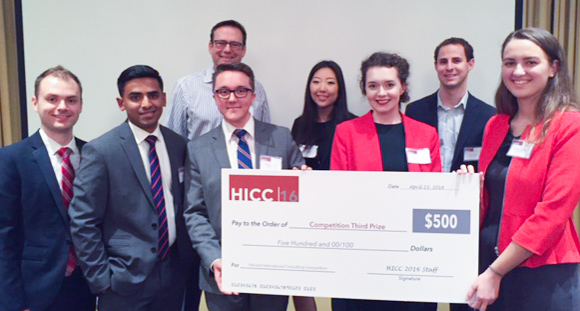- Future Students
- Current Students
- Faculty
- Staff
- Alumni
- Others
UofGH students place in top 3 at Harvard case competition

After learning the theories and principles of business in the classroom, University of Guelph-Humber students like to put their knowledge to work. To showcase what they know, students compete at case competitions, going head-to-head against some of the country’s best students to solve the problems of major companies. While the situations are fictional, the ideas, professional judges and spirit of competition are very real.
In recent months, they’ve been on a hot streak, taking home prizes from universities in Toronto, Ottawa and scoring 20 top three finishes during the 2015-16 academic year. Now, they can add Harvard to the list.
In late April, two groups of UofGH students flew to Boston to compete in the Harvard International Consulting Competition. Their task was monumental. In their given scenario, the US’ biggest pharmacy wanted to expand its chain around the world and the students had to propose how they’d do it. They were competing against 32 teams, and created a plan they thought would bring the company to global dominance. After all the presentations were complete and the points had been tallied, one of UofGH’s teams was picked to proceed to the final four.
Tomson Varghese, a 2016 Business grad, was on the competing team at Harvard. He says that after they’d pushed through a series of unfortunate interruptions during their presentation, the team was relieved to have made it to the next round.
“We’d been preparing for this competition all year long, so it was a big privilege just to compete,” he says. “When they called out the finalists, we were totally psyched, it felt like it was our moment.”
They continued confidently into the final round and delivered a presentation that left the other attendees and the judges impressed. After the cases were made and the scores counted, their team was awarded third place and a $500 prize.
In his four years at UofGH, Tomson has competed in no less than 12 case competitions like the one at Harvard. He thinks more students should take the chance to get involved and put their skills to the test.
“At case competitions you get to implement everything you’ve studied and learned to find out what will work. It’s a simulation of a real world problem,” he says. He quickly adds that they can be a lot of fun too. “These competitions give you a rush; you’re filled with energy when you do it. Students should jump at these opportunities and get right into them.”
When they weren’t competing, the students got an insider’s view into the consulting industry. They met with employers, heard speeches from industry professionals and learned what some of the premier firms are looking for in new recruits. Impressed by their skills, the CEO and VP of a major American consulting company took UofGH’s teams out to lunch, offering career advice and presentation tips.
UofGH’s Assistant Program Head of Business, Justin Medakiewicz, trained the team for the competition and traveled with them to Harvard.
“I’m amazed with our results: there was a competition just to get into this competition and we had two teams make the cut,” he says. “Taking third place validates all the hard work they’ve put into this.”
Though the school year’s over, he’s already looking forward to getting teams ready for next year’s case competitions.
“The foundation of our pedagogy at UofGH is combining theoretical and hands-on learning. Preparing for these competitions requires building presentation skills, developing a professional approach and learning how to handle different scenarios — it all complements and reinforces what our students learn in the classroom.”
Learn more about Business at UofGH.

